(This story was inspired by discovering that the tiny lights reflected by our flashlights in the grass, which we thought were droplets of water, are actually the eyeshine of spiders.)
When a spider lays the eggs of her thousand children, she wraps them round in steely filaments of light. In that wrap is folded the pattern of their ancestors, the pattern they will emerge already knowing how to weave. That pattern is their creation story. It goes like this:
In the beginning, there were two blades of grass.
These two blades of grass felt themselves to be utterly different from one another. One was frondy and one was slender. One was sharp-edged and one was round. One was wispy and one was heavy with green. One lay flat and one quavered back and forth, when the wind blew.
They thought they had nothing to do with each other. Each thought the other was ignorant and wrong. They were two polarities, opposites. They could not communicate or agree on anything.
Now God came crawling along and climbed up one blade of grass. The grasses knew She was God, because She had eight legs, the number of infinity. And so the first blade of grass, eager for a divine listener, told about all the strangeness and wrongness of the other: how the other was too frondy or wispy or round. And then God crawled down and over and climbed up the other blade of grass. And that blade of grass, just as eagerly, told about the strangeness and wrongness of the first one.
Then God, curious, crawled back and forth, back and forth, listening to these complaints over and over, until the two voices merged in Her mind like one river, and She understood that really, they were one. Really, these blades of grass were longing to connect, but did not know how to do it.
Now the mind of God is very wise, and can perceive the sacredness of space, space that might seem to others like just empty nothingness. She can perceive the potential in that nothingness. She can perceive the tension there, and in that tension, the meaning of existence. So after meditating for a long time on that long, lonely space between the two blades of grass, going back and forth, back and forth between them until She understood in Her round, holy abdomen the shape of that space, She began to weave the meaning. She wove the longing itself. She wove the question. It was a pattern of delicate complexity and geometrically perfect beauty. Yet it was invisible.
Then She spiraled in to the center of this pattern and sat down to wait. The blades of grass were silent, in awe of their newfound connection, made sacred and real by God’s web.
Over time, dew collected on the spokes of this wheel She had woven. Little particles of all the matter of the universe stuck to the dew, and made colors in the light. And as life collected on the web, these became the waters and plants and beings of the world. And this is how the world was formed.
The principle of the world is connection. God taught us that all things are connected. She taught us to see meaning in space. She taught us that connection is longing, and longing is connection.
We spiders are made in the image of God. We are the keepers of space, and the keepers of silence. We are the consciousness at the center of the spiral. We connect the spaces; we bind the forests and the meadows together with our spirals and nets and funnels and cups and veils, and we give places meaning. We are the dreamcatchers.
And the other beings of the world—they are not immortal like us, sitting infinitely patient, reweaving the pattern again and again forever. They are the ones who stand separate from one another, and whose shapes inspire us. Or they are the ones who fly into the web and get caught, not understanding the bigger picture, unable to see it. We are the artists, and they are the ones who live and die. They inspire us, because when they fly into our webs and destroy them, they are our answers.
Remember that the whole world is a dream woven, a longing between two opposites, given shape.
Remember that this web was woven for a reason: it is a prayer waiting to catch an answer. Every now and then the answer comes. An asteroid, perhaps. Some change so massive, it destroys the web of life itself. But do not be frightened, because a spider never gives up. God will always weave the web again: it will be there in the morning.
That destruction was the answer God built the web for: the fly that finally got caught. What was the answer? What was the question? Only God knows. She swallowed it up, tucked it away into her great round abdomen, and wove a new web from there. Whatever it was, whatever it is, we are living it now, until the next answer comes.
The sacred pattern is never going to be lost. You can see it sometimes, if you pay attention, like a symbol, or a holy word. On the backs of beetles. On butterfly wings. In the way ants move. In the way water turns around a stone. Each thread of this life is touched at all times by one of the eight sticky fingers of God. She is always aware of everything. She senses each tiny motion. She is awareness itself.
One more thing, baby spiders. Some creatures in this world are very large, so large you can hardly imagine them, much bigger than we. They are too big, really, to matter. They will not survive long. And yet sometimes they will blunder through your web and destroy it. They are not the answer you are waiting for. And you cannot stop them from their blunders. This is impossible. All you can do is make your web of beauty. Startle them into awe with the dew. Let your filaments collapse upon them—frighten them with threads and wispy fingers, or better yet, make them tingle, so that they stop and learn to feel again, as delicately as spiders do.
This is all you can do.
But it is enough.
And those of you who live among the grasses and never make webs, who spend all your lives in exploring the different blades, running back and forth between them, you hunting spiders of the night—you too are sacred. They will shine their flashlights in your eyes, without knowing it, and you will shine back rainbows.
When a spider lays the eggs of her thousand children, she wraps them round in steely filaments of light. In that wrap is folded the pattern of their ancestors, the pattern they will emerge already knowing how to weave. That pattern is their creation story. It goes like this:
In the beginning, there were two blades of grass.
These two blades of grass felt themselves to be utterly different from one another. One was frondy and one was slender. One was sharp-edged and one was round. One was wispy and one was heavy with green. One lay flat and one quavered back and forth, when the wind blew.
They thought they had nothing to do with each other. Each thought the other was ignorant and wrong. They were two polarities, opposites. They could not communicate or agree on anything.
Now God came crawling along and climbed up one blade of grass. The grasses knew She was God, because She had eight legs, the number of infinity. And so the first blade of grass, eager for a divine listener, told about all the strangeness and wrongness of the other: how the other was too frondy or wispy or round. And then God crawled down and over and climbed up the other blade of grass. And that blade of grass, just as eagerly, told about the strangeness and wrongness of the first one.
Then God, curious, crawled back and forth, back and forth, listening to these complaints over and over, until the two voices merged in Her mind like one river, and She understood that really, they were one. Really, these blades of grass were longing to connect, but did not know how to do it.
Now the mind of God is very wise, and can perceive the sacredness of space, space that might seem to others like just empty nothingness. She can perceive the potential in that nothingness. She can perceive the tension there, and in that tension, the meaning of existence. So after meditating for a long time on that long, lonely space between the two blades of grass, going back and forth, back and forth between them until She understood in Her round, holy abdomen the shape of that space, She began to weave the meaning. She wove the longing itself. She wove the question. It was a pattern of delicate complexity and geometrically perfect beauty. Yet it was invisible.
Then She spiraled in to the center of this pattern and sat down to wait. The blades of grass were silent, in awe of their newfound connection, made sacred and real by God’s web.
Over time, dew collected on the spokes of this wheel She had woven. Little particles of all the matter of the universe stuck to the dew, and made colors in the light. And as life collected on the web, these became the waters and plants and beings of the world. And this is how the world was formed.
The principle of the world is connection. God taught us that all things are connected. She taught us to see meaning in space. She taught us that connection is longing, and longing is connection.
We spiders are made in the image of God. We are the keepers of space, and the keepers of silence. We are the consciousness at the center of the spiral. We connect the spaces; we bind the forests and the meadows together with our spirals and nets and funnels and cups and veils, and we give places meaning. We are the dreamcatchers.
And the other beings of the world—they are not immortal like us, sitting infinitely patient, reweaving the pattern again and again forever. They are the ones who stand separate from one another, and whose shapes inspire us. Or they are the ones who fly into the web and get caught, not understanding the bigger picture, unable to see it. We are the artists, and they are the ones who live and die. They inspire us, because when they fly into our webs and destroy them, they are our answers.
Remember that the whole world is a dream woven, a longing between two opposites, given shape.
Remember that this web was woven for a reason: it is a prayer waiting to catch an answer. Every now and then the answer comes. An asteroid, perhaps. Some change so massive, it destroys the web of life itself. But do not be frightened, because a spider never gives up. God will always weave the web again: it will be there in the morning.
That destruction was the answer God built the web for: the fly that finally got caught. What was the answer? What was the question? Only God knows. She swallowed it up, tucked it away into her great round abdomen, and wove a new web from there. Whatever it was, whatever it is, we are living it now, until the next answer comes.
The sacred pattern is never going to be lost. You can see it sometimes, if you pay attention, like a symbol, or a holy word. On the backs of beetles. On butterfly wings. In the way ants move. In the way water turns around a stone. Each thread of this life is touched at all times by one of the eight sticky fingers of God. She is always aware of everything. She senses each tiny motion. She is awareness itself.
One more thing, baby spiders. Some creatures in this world are very large, so large you can hardly imagine them, much bigger than we. They are too big, really, to matter. They will not survive long. And yet sometimes they will blunder through your web and destroy it. They are not the answer you are waiting for. And you cannot stop them from their blunders. This is impossible. All you can do is make your web of beauty. Startle them into awe with the dew. Let your filaments collapse upon them—frighten them with threads and wispy fingers, or better yet, make them tingle, so that they stop and learn to feel again, as delicately as spiders do.
This is all you can do.
But it is enough.
And those of you who live among the grasses and never make webs, who spend all your lives in exploring the different blades, running back and forth between them, you hunting spiders of the night—you too are sacred. They will shine their flashlights in your eyes, without knowing it, and you will shine back rainbows.
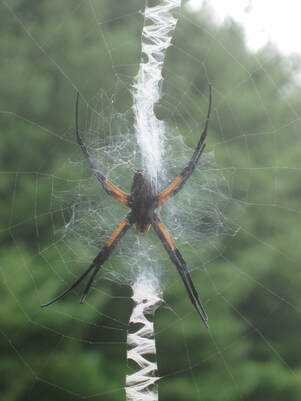
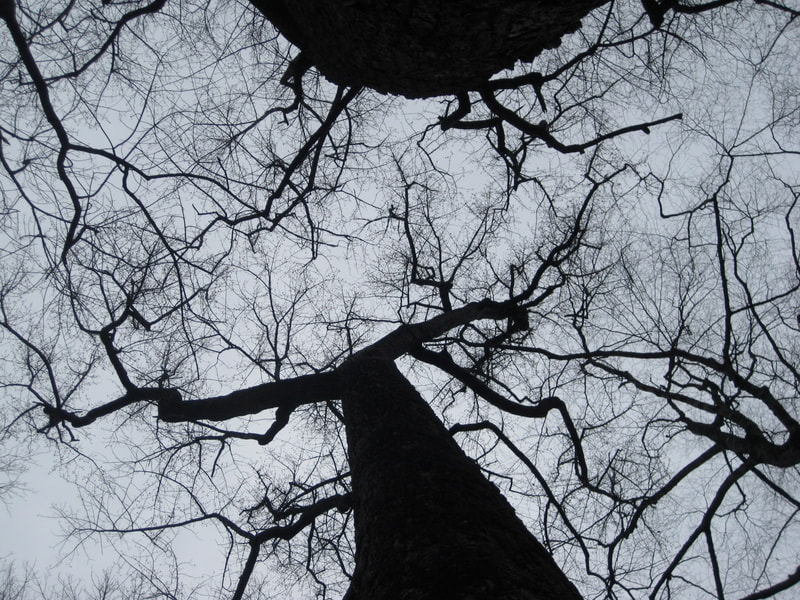
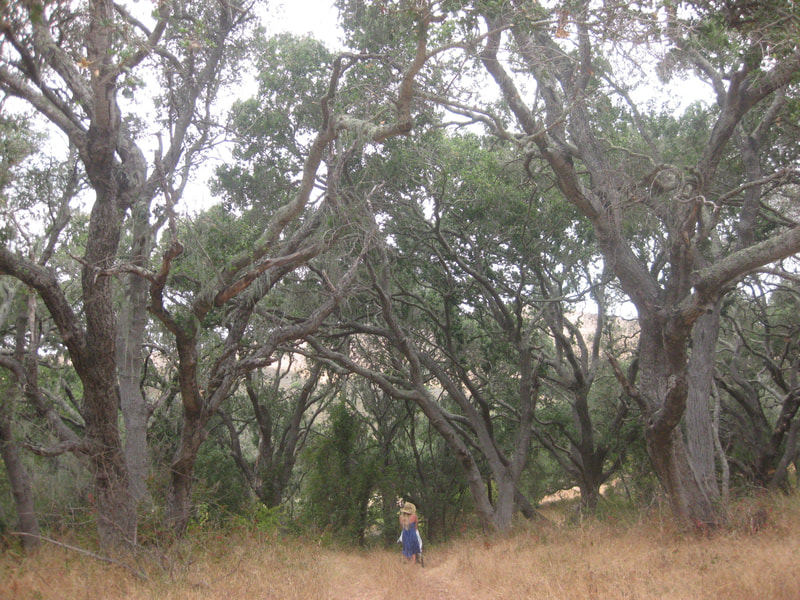
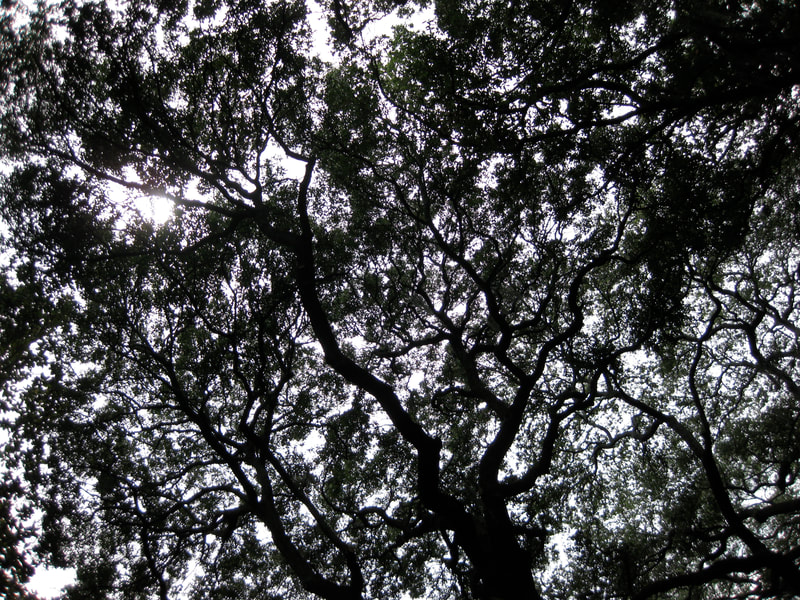
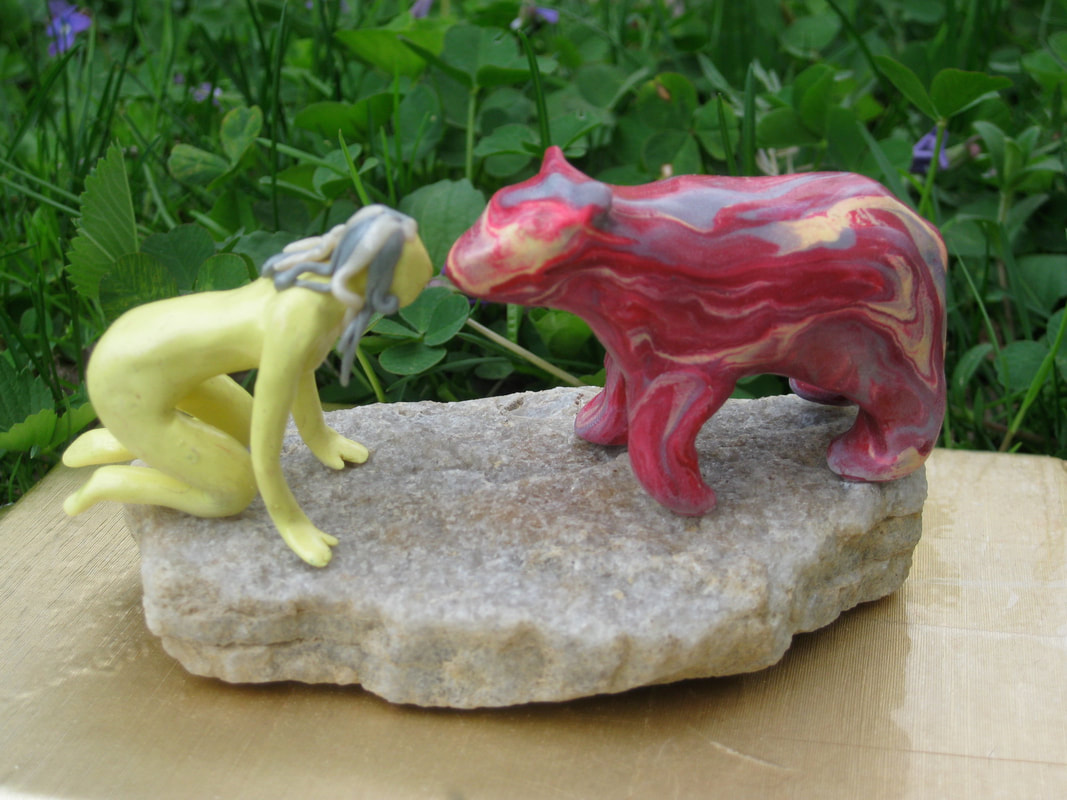
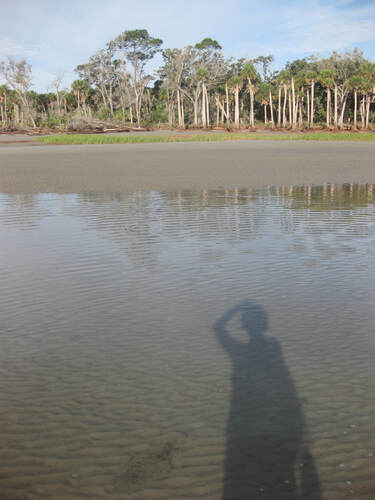

 RSS Feed
RSS Feed
